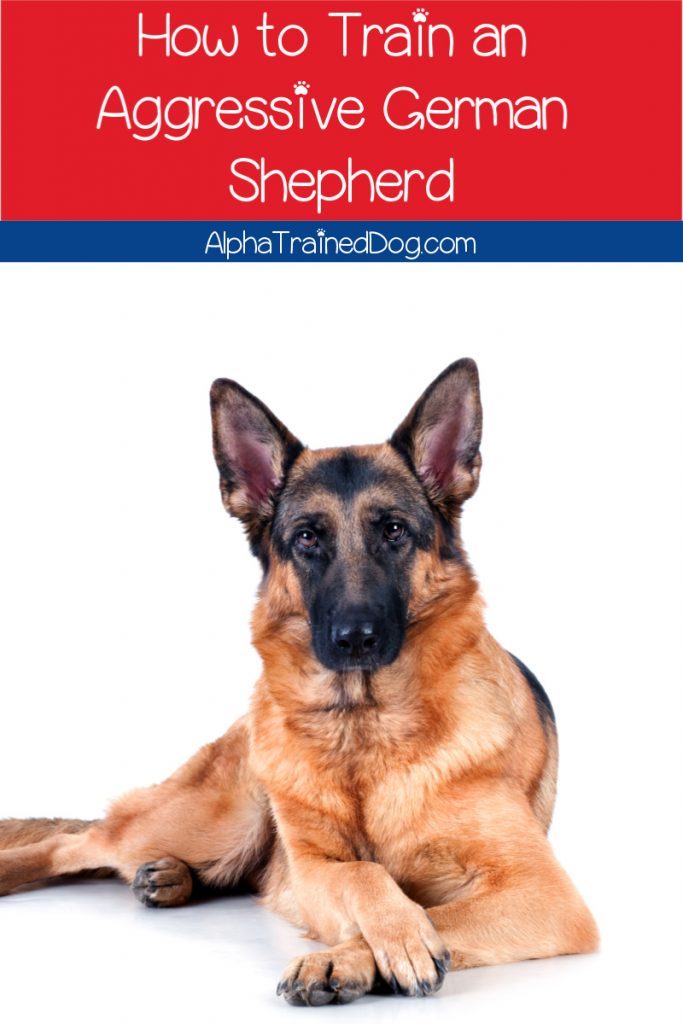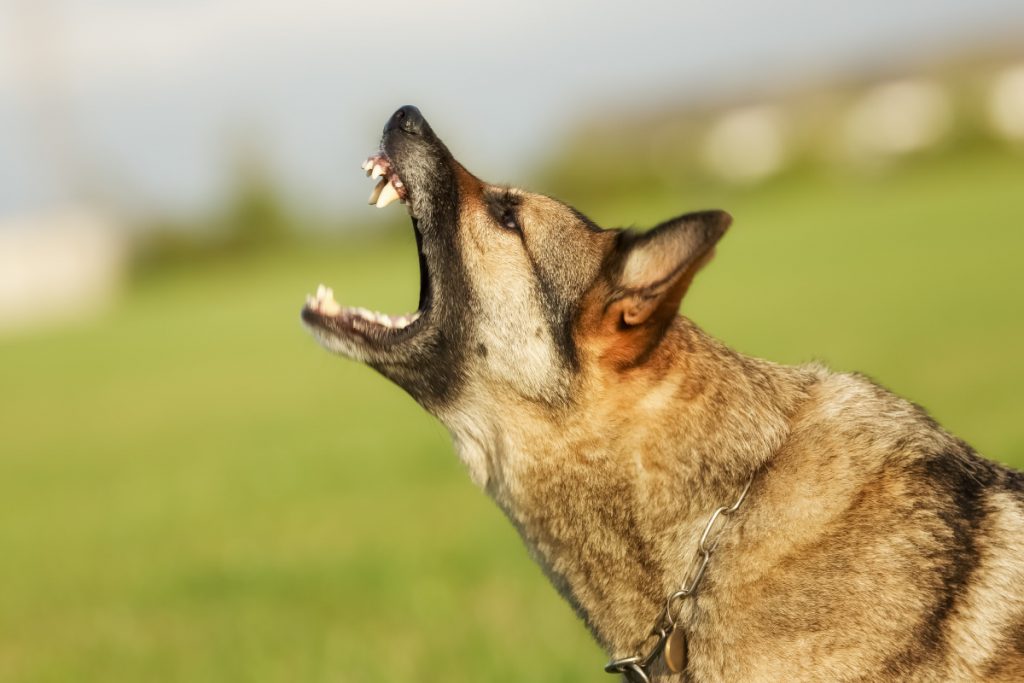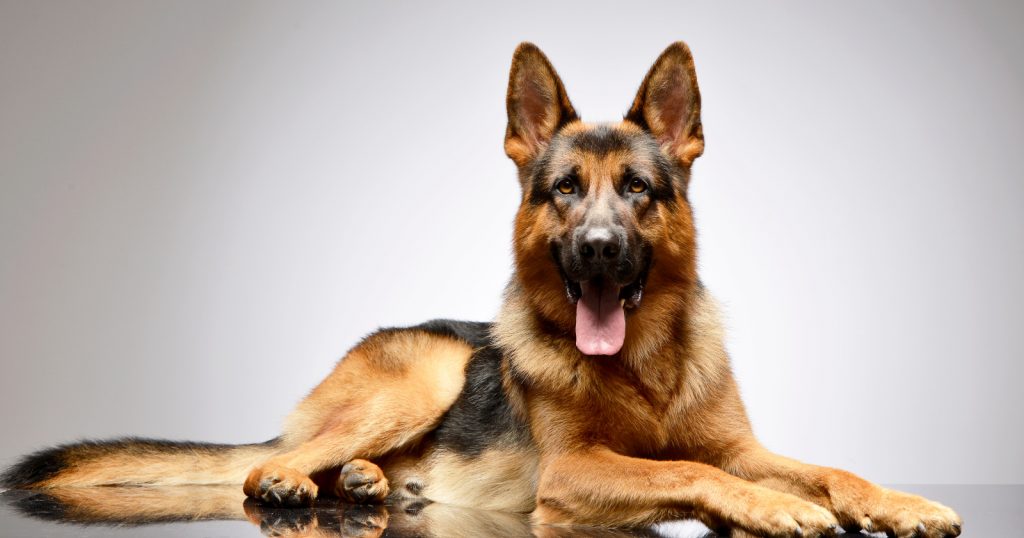Are you wondering how to train an aggressive German Shepherd?
German Shepherd might make excellent guard dogs, but aggressiveness is not something that you want to encourage.
Fortunately, I’ve got your back with seven German Shepherd training tips to manage aggression.
Related ➔ How to Train An Aggressive Dog

8 Easy Tips on How to Train an Aggressive German Shepherd
German Shepherds are still one of the most popular breeds and with good reasons.
These stunning dogs are intelligent, brave, and loyal.
They’re eager to have a job to do and are so versatile that they’re equally good as police dogs and family companions.
However, German Shepherds are powerful and muscular dogs with strong protective instincts.
While no one pays much attention to a barking/growling toy dog, an attacking German Shepherd can scare even professionals.
As such, it’s important to curb any aggressive tendencies as soon as possible.
Otherwise, you and your German Shepherd can get into a lot of trouble.

#1 Determine Your German Shepherd’s Triggers
As a whole, German Shepherds aren’t aggressive dogs.
They’re reserved against strangers and take their time to warm up to people, but German Shepherds should never be openly aggressive.
When a German Shepherd is aggressive, there’s a good reason behind this behavior, even if it’s not apparent at first glance. Lack of socialization, fear, anxiety, stress, and pain are common dog aggression triggers.
So, your first step is to determine who/which your German Shepherd is aggressive towards.
Is it other animals, strangers, or family members? Observe your dog and make a list of the triggers.
#2 Learn Your German Shepherd’s Body Language
Dogs rarely attack out of the blue. Usually, there are plenty of warning signs that people have ignored.
So, your next step in training your aggressive German Shepherd is to recognize these warning signs so that you can intervene in time. Look for:
- Growing/Snarling
- Excessive barking
- Showing teeth
- Snapping or nipping
- Rigid body
- Yawing
- Lunching
All these signs show that your German Shepherd is feeling uncomfortable, stressed, or afraid.
If you don’t take measures to deescalate the situation and your German Shepherd feels trapped, your dog might bite or attack.
German Shepherd puppies often bite when they’re teething, but that’s usually not a sign of aggression.
So, you’re going to use different strategies to get your teething German Shepherd puppy to stop biting.
#3 Pick the Right Equipment
Whenever you’re training an aggressive German Shepherd, you have to consider safety first.
Depending on your dog’s level of aggressiveness, you should think about a muzzle or a head halter.
It helps in more ways than you think.
When you have an aggressive dog, you’re always on the toes how they would react around triggers.
Your German Shepherd can feel your anxiety, and it makes them nervous, afraid, and defensive.
If your dog is in such a mental state, training to lessen the aggressiveness will ultimately fail.
Your dog will never get used to their triggers if they’re stressed.
On the other hand, when you know that your dog can’t injure anybody, you will be able to project calmness and assertiveness that will reassure your German Shepherd.
However, the muzzle is a tool to help you train your aggressive German Shepherd.
It’s not a solution to your problem. Keep that in mind.
Besides safety, you should choose a training treat that will motivate your German Shepherd to behave.
You have to pick something delicious and irresistible and use it only when you’re training your German Shepherd not to be aggressive.
#4 Work on One Trigger at a Time
Some of your German Shepherd’s triggers you can avoid.
You can go for walks in the quiet hours so that you don’t meet many people or dogs. Placing a barrier between the triggers and the dog also works.
Unfortunately, you can’t avoid all triggers, especially if your German Shepherd is aggressive towards other family members.
In these cases, you have to determine your dog’s level of aggressiveness.
If your dog is too reactive and difficult to control, you should consider working with a professional trainer and attending dog training classes.
Asking for help is the responsible thing to do.
Otherwise, you can try to desensitize your German Shepherd to the triggers.
You’ll have to do it one at a time and use a lot of positive reinforcement. Then:
- Think about how to make your dog’s triggers less intensive. For example, if your dog is aggressive to strangers, ask a friend (unfamiliar to your dog) to walk past the house.
- Expose your German Shepherd to the low-intensive trigger in a controlled situation. Reward whenever your dog remains neutral.
- If the dog reacts aggressively, pull back, and think about how to lower the intensity of the trigger.
- Once your dog is calm around the low-intensity trigger, you can slowly increase the intensity.
- You keep rewarding your German Shepherd when they’re relaxed around the trigger so that they associate it with positive things. That’s why we call it positive reinforcement training.
#5 Have Short Training Sessions
Whenever you’re getting your German Shepherd comfortable around their triggers, you have to plan short sessions.
For one, dogs don’t have a big attention span.
For another, the more bored/frustrate your German Shepherd gets, the more likely it is for them to react aggressively.
Instead, plan several short training sessions a day and make them a part of your daily routine.
Aim to end things on a positive note so that your German Shepherd looks forward to the next session.
#6 Be Patient
Training your aggressive German Shepherd isn’t going to happen overnight.
It will take a lot of time and patience. Increasing the intensity of the trigger too fast might lead to an aggressive response and ruin all the hard work you’ve done so far.
As such, you have to take baby steps and praise/reward even the barest success to encourage your German Shepherd.
#7 Avoid Punishments
The worst thing you can do whenever you’re handling an aggressive German Shepherd is to yell or use physical force.
Your German Shepherd is already out of their comfort zone, and any additional stress will escalate the situation.
Moreover, punishing your dog whenever they’re growling or snapping is a bad idea.
When your German Shepherd is uncomfortable next time, they might bite or attack without warning.
#8 Take Your German Shepherd to the Vet
If your German Shepherd is aggressive out of the blue, it’s time for a trip to the vet.
That’s because your German Shepherd might be sick even if they seem perfectly healthy.
When dogs are in pain, they are vulnerable and afraid and might growl or attack to protect themselves.
Underlying medical conditions that affect the hormones might also trigger your dog’s aggressiveness.
So, any drastic change in behavior is a health warning sign.

Knowing how to train your aggressive German Shepherd is important so that you can avoid accidents and do the best for your dog.
Don’t ever ignore aggression because it’s a symptom that your German Shepherd has a problem.
It might be something as simple as fear or as urgent as an illness.
What do you think about these 8 tips on how to train an aggressive German Shepherd? Tell us in the comments.



This is such a helpful post, thank you for sharing! I have a tiny dog at the moment (a little Brussels Griffon!) but we’re hoping to adopt a second, bigger, dog in the future so I am sure these tips will be useful! x
Great tips! Body language is huge. I think they respond most to that.
Even though I’ve adored cute puppies since my childhood, I’ve always stayed away from bigger breads that could get aggressive. It’s important to know how to train them correctly.
Such beautiful and intelligent dogs. One of my favourite breeds. They respond really well to training and love executing commands. A wonderful loyal companion.